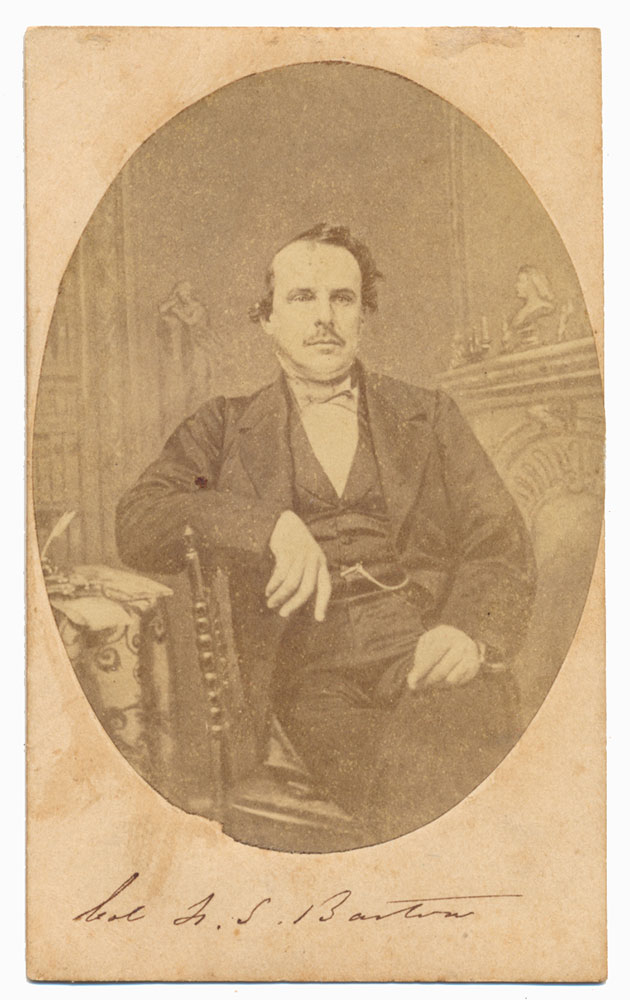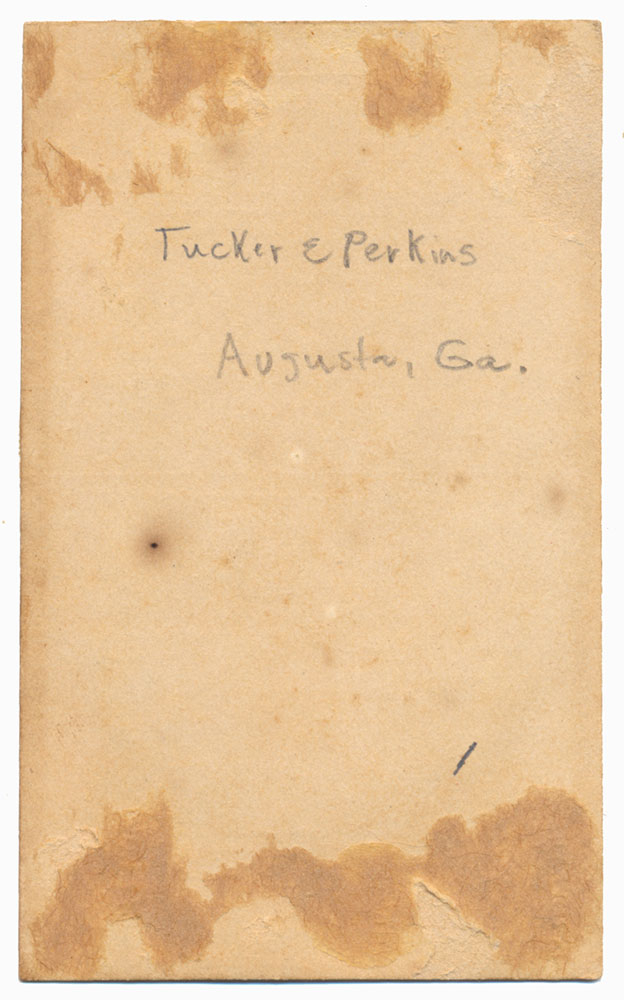site search
online catalog
CDV OF COLONEL FRANCIS STEBBINS BARTOW, THE FIRST COMMANDER KILLED IN BATTLE DURING THE CIVIL WAR AT FIRST MANASSAS

Hover to zoom


$550.00 SOLD
Quantity Available: None
Item Code: 846-552
Here we have a view of Colonel Bartow in civilian clothing, likely around 1860 when Bartow was a congressman for his home state of Georgia. The image is an oval shaped vignette of Bartow seated in a parlor. The photograph is affixed to a plain mount. An ink inscription, “Col F.S. Bartow,” is present below the image.
A modern pencil notation appears on the reverse, and it reads: ‘Tucker & Perkins / Augusta, Ga.” This notation indicates that the image likely came from the photographic gallery of Tucker and Perkins in Augusta. We have seen other examples of this view with such a photographer’s label on the back of the cardmount.
Overall, this image is in fairly good condition. There is some surface dirt throughout with minor age toning as expected. Looking at the reverse, it appears that this image may have been adhered to another page at some point. Spots of paper remain adhered to the top and bottom margins where other spots of the mount have pulled away.
Born in Savannah on September 6, 1816, to Frances Lloyd Stebbins and Theodosius Bartow, Francis Stebbins Bartow would grow to become an attorney and politician. Bartow began his career at the University of Georgia and then attended Yale Law School. After graduating, he returned to his home state and began practicing law with John Berrien, a Georgia senator and attorney general of the United States from 1829-1831. In 1844, Bartow married Louisa Berrien, John’s daughter, which clearly enabled Bartow’s political career. He served two terms in the House of Representatives and one term as a senator.
Bartow was a proponent of secession and campaigned for a new nation that would thrive on the economy of slavery. He was part of the secession convention and when Georgia did secede in January 1861, he was elected to the Provisional Confederate Congress. Bartow also chaired the military affairs committee.
In 1856 Bartow was elected captain of the Oglethorpe Light Infantry, a Savannah militia unit, which Bartow would lead in capturing Fort Pulaski in 1861. When the war broke out in April, Bartow took the Oglethorpe Light Infantry to the field in Virginia with state owned muskets, a circumstance which the Governor of Georgia did not appreciate. After a heated series of letters, Bartow told the governor in so many words that he did not have time for his non-sense. Bartow famously said “I go to illustrate, if I can, my native state,” another phrase which would adorn his final resting place. Once the Oglethorpes arrived, Bartow took command as colonel of the 8th Georgia. Less than four months later, during a brash charge against Union artillery, Bartow was killed. [cla][ph:L]
~~~~~~~~~~~~~~~~~~~~~~~~~~~~~~~~~~~
THIS ITEM, AS WITH ALL OTHER ITEMS AVAILABLE ON OUR WEB SITE,
MAY BE PURCHASED THROUGH OUR LAYAWAY PROGRAM.
CLICK HERE FOR OUR POLICIES AND TERMS.
THANK YOU!
Inquire About CDV OF COLONEL FRANCIS STEBBINS BARTOW, THE FIRST COMMANDER KILLED IN BATTLE DURING THE CIVIL WAR AT FIRST MANASSAS
Most Popular
Historical Firearms Stolen From The National Civil War Museum In Harrisburg, Pa »
Theft From Gravesite Of Gen. John Reynolds »
Selection Of Unframed Prints By Don Troiani »
Fine Condition Brass Infantry Bugle Insignia »
British Imported, Confederate Used Bayonet »
Scarce New Model 1865 Sharps Still In Percussion Near Factory New »
featured item
CAVALRY OFFICER’S SABRE IDENTIFIED TO CAPTAIN MARCUS A. MOORE, 1ST MASSACHUSETTS CAVALRY
Manufactured: Newark, NJ Maker: Sauerbier, Henry Year: Early Civil War Model: Model 1840 transitional with 1860 style grip Size: 34.2 inch blade, 1.17 wide, .353 thick This sword has all true Type 1 features with the exception of the Model 1860 style… (870-159). Learn More »


